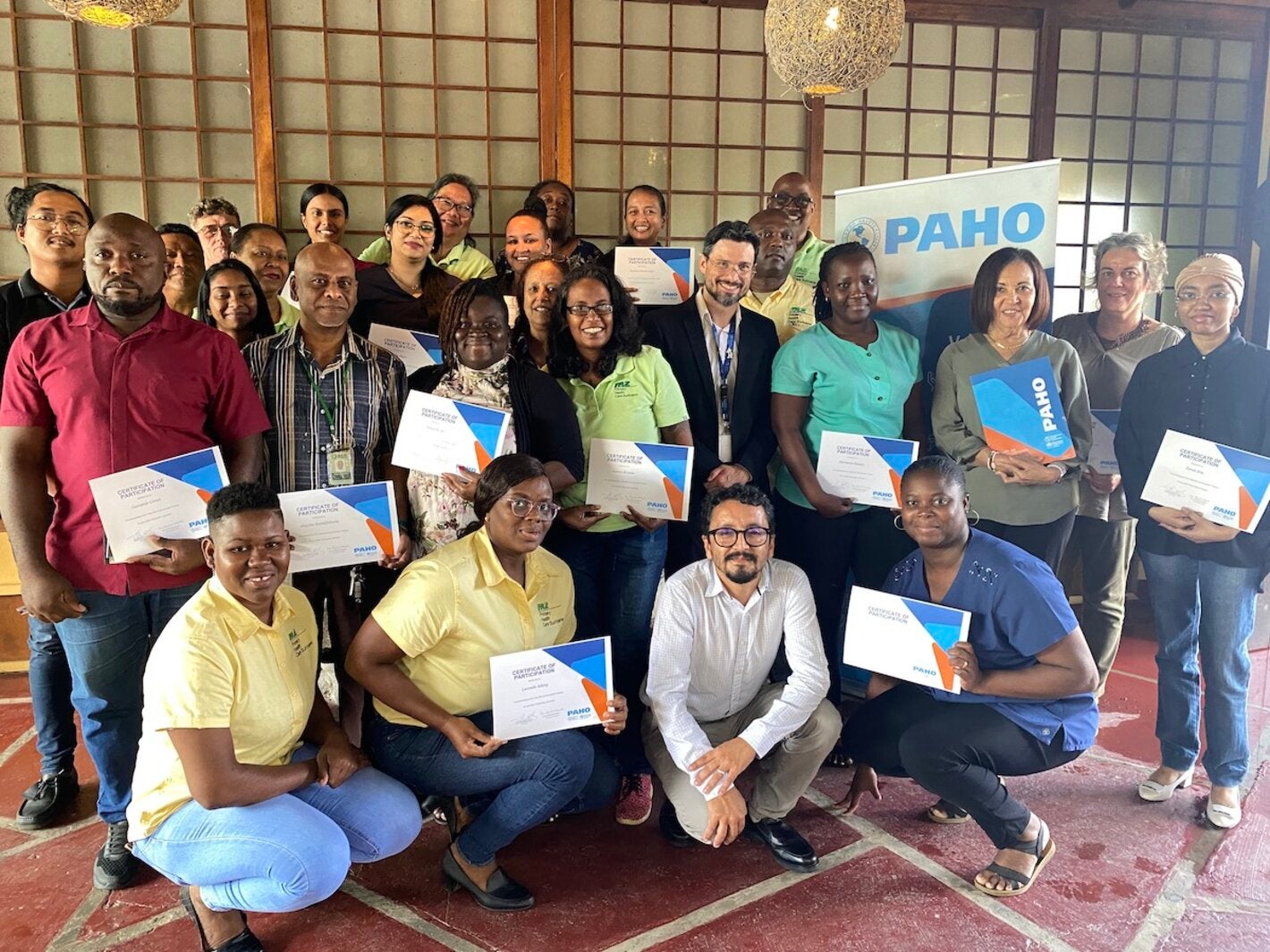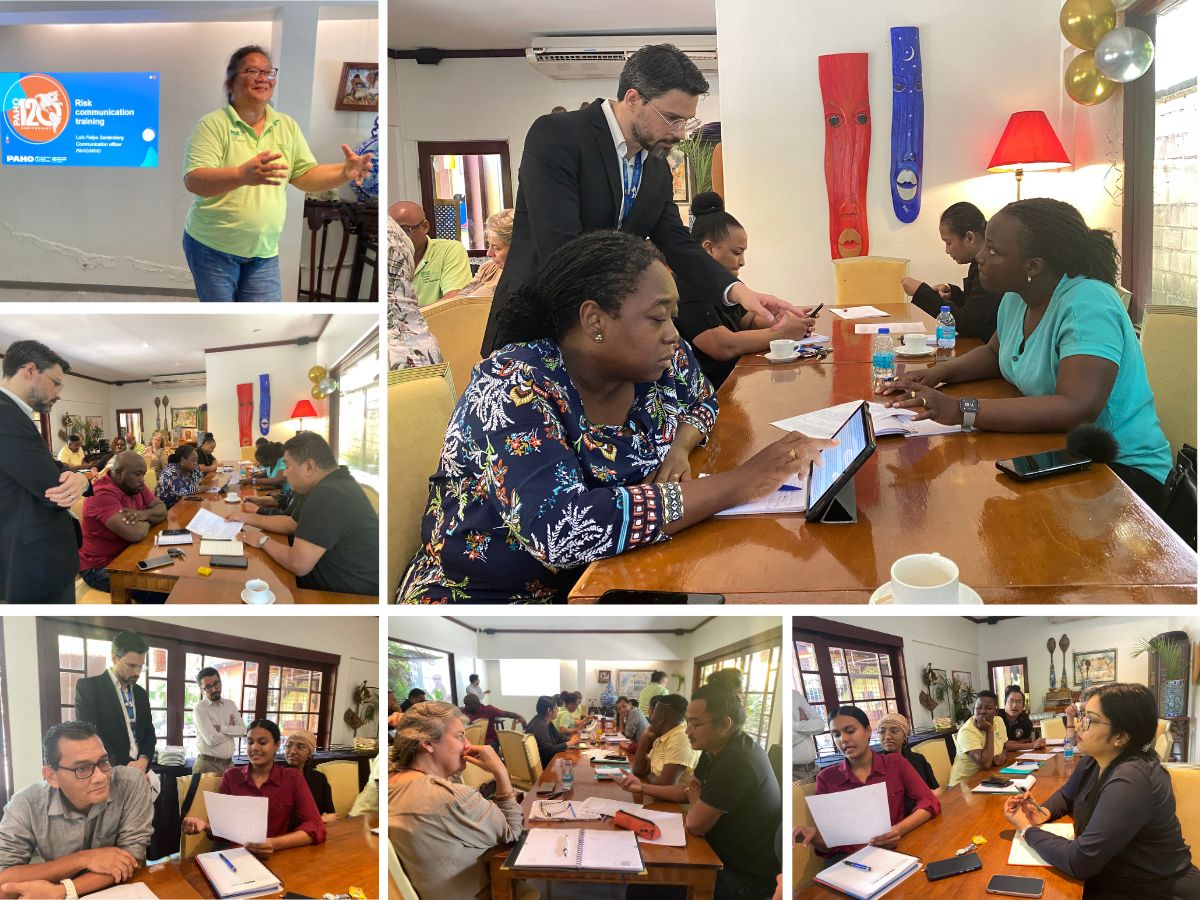
Suriname, June 19, 2023 (PAHO/WHO) – The Pan American Health Organization country office in Suriname organized a one-day Risk Communication training session aimed at equipping key stakeholders with the skills and knowledge required to effectively communicate risk-related information. The training was officially opened by the PAHO/WHO Representative Dr. Lilian Reneau-Vernon and the Deputy Director of the Medical Mission Dr. Maureen Wijngaarde-van Dijk.
Representatives from crucial agencies involved in public health and safety, including the Medical Mission, Regional Health Department, Public Health Bureau, Ministry of Health, Ministry of Natural Resources, Red Cross Suriname, Malaria Program and the Directorate of National Security, participated in this one-day training session.
The training session focused on several critical learning objectives that would empower participants to effectively communicate risk-related information and ensure that accurate and timely messages reach the public. Participants were guided through various topics, including understanding risk communication, recognizing cognitive biases and risk perception, setting clear communication objectives, identifying target audiences, crafting evidence-based key messages, and strategies to combat misinformation and disinformation.
The participants gained a comprehensive understanding of the importance of risk communication and its role in safeguarding public health and safety. They explored the various methods and techniques to address cognitive biases that can hinder effective communication. By addressing these biases, participants learned how to deliver information clearly and concisely, ensuring that messages resonate with the public.
One of the key takeaways from the training session was the importance of setting a Single Overarching Communication Outcome (SOCO). Participants were encouraged to define a primary communication outcome aligned with their organizational goals, enabling them to focus their communication efforts and maximize their impact. This approach ensures that the messages are purposeful and directed towards achieving the desired outcomes.
Dr. Maureen Wijngaarde-van Dijk, Deputy Director of the Medical Mission, shared her positive assessment of the training.
I truly believe that the training was of immense value to all participants. We created a safe and inclusive environment that encouraged active engagement, critical thinking, and even challenging the trainer's perspectives. The trainer's presentation style was in perfect alignment with the risk communication guidelines that the Medical Mission envisions developing for Suriname. Despite the vast amount of information covered within a relatively short timeframe, the training served as an excellent test to evaluate the assimilation and practical application of this knowledge by non-medical civil servants that were also present here today." - Dr. Maureen Wijngaarde-van Dijk, Deputy Director of the Medical Mission
Recognizing the diversity of stakeholder groups, participants also learned how to identify and analyze their target audiences. By tailoring messages and strategies to the specific needs and characteristics of different segments of the population, they can effectively engage and inform the public.
Moreover, the training emphasized the development of evidence-based key messages. Participants were guided on how to communicate complex information in a manner that is accessible, understandable, and trustworthy to the public. This approach builds credibility and fosters public trust, enabling individuals to make informed decisions regarding their health and safety.
In an era marked by the rapid spread of misinformation and disinformation, participants also learned strategies to combat false information effectively. Armed with these skills, they can debunk false information and address public concerns, ensuring that accurate and reliable information prevails.
A key takeaway from the risk communication training in Suriname was the formula for successful risk communication. During the training, participants learned that accuracy and timeliness are essential elements in risk communication. In addition to accuracy and timeliness, the training emphasized the importance of empathy and transparency in risk communication. Empathy involves understanding the concerns, fears, and emotions of the audience. The combination of empathy and transparency creates an environment where individuals feel heard, understood, and respected. It encourages open dialogue, allowing for the exchange of information and concerns. This trust-building process is crucial for risk communication, as it establishes a foundation of credibility and confidence in the messages being conveyed.
The trainer and Communication Officer of the PAHO/WHO country office in Brazil, Luís Felipe Sardenberg expressed his appreciation for the opportunity to collaborate with Suriname and the participants.
"I have been truly impressed by the remarkable commitment Suriname possesses in strengthening its capacities in the area of risk communication. I am grateful for the chance to work alongside the participants, exchanging experiences and knowledge and the opportunity to collaborate and learn from the participants has been invaluable. Together, we aim to empower individuals with lifesaving information to better protect themselves and their communities." - Luís Felipe Sardenberg
PAHO/WHO commends the commitment and dedication of all participating local agencies. By actively engaging in this training initiative, Suriname is taking proactive measures to strengthen risk communication efforts and safeguard public health and safety. PAHO/WHO recognizes the importance of equipping key stakeholders with the necessary tools to effectively communicate risk-related information and encourages continued collaboration and implementation of the strategies learned during the training.
By enhancing risk communication capabilities, Suriname is poised to face future challenges with resilience, ensuring that the public remains well-informed and protected.




